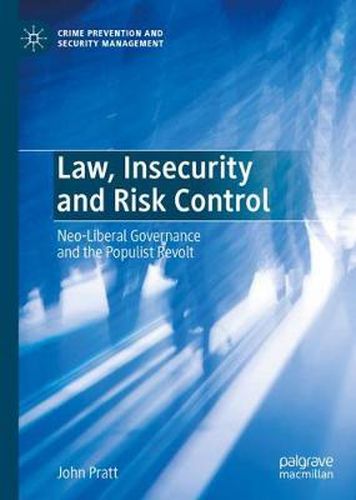Readings Newsletter
Become a Readings Member to make your shopping experience even easier.
Sign in or sign up for free!
You’re not far away from qualifying for FREE standard shipping within Australia
You’ve qualified for FREE standard shipping within Australia
The cart is loading…






This title is printed to order. This book may have been self-published. If so, we cannot guarantee the quality of the content. In the main most books will have gone through the editing process however some may not. We therefore suggest that you be aware of this before ordering this book. If in doubt check either the author or publisher’s details as we are unable to accept any returns unless they are faulty. Please contact us if you have any questions.
This book examines our contemporary preoccupation with risk and how criminal law and punishment have been transformed as a result of these anxieties. It adopts an historical approach to examine the development of risk control measures used across the US, UK, New Zealand, Australia and Canada - particularly since the 1980’s - with the rise of the security sanction . It also takes a criminological and sociological approach to analysing shifts in criminal law and punishment and its implications for contemporary society and criminal justice systems.
Law, Insecurity and Risk Control analyses the range and scope of the ‘security sanction’ and its immobilizing measures, ranging from control over minor incivilities to the most serious crimes. Despite these innovations, though, it argues that our anxieties about risk have become so extensive that the security sanction is no longer sufficient to provide social stability and cohesion. As a consequence, people have been attracted to the ‘magic’ of populism in a revolt against mainstream politics and organisations of government, as with the EU referendum in the UK and the US presidential election of Donald Trump in 2016. While there have been political manoeuvrings to rein back risk and place new controls on it, these have only brought further disillusionment, insecurity and anxiety. This book argues that the security sanction is likely to become more deeply embedded in the criminal justice systems of these societies, as new risks to both the well-being of individuals and the nation state are identified.
$9.00 standard shipping within Australia
FREE standard shipping within Australia for orders over $100.00
Express & International shipping calculated at checkout
This title is printed to order. This book may have been self-published. If so, we cannot guarantee the quality of the content. In the main most books will have gone through the editing process however some may not. We therefore suggest that you be aware of this before ordering this book. If in doubt check either the author or publisher’s details as we are unable to accept any returns unless they are faulty. Please contact us if you have any questions.
This book examines our contemporary preoccupation with risk and how criminal law and punishment have been transformed as a result of these anxieties. It adopts an historical approach to examine the development of risk control measures used across the US, UK, New Zealand, Australia and Canada - particularly since the 1980’s - with the rise of the security sanction . It also takes a criminological and sociological approach to analysing shifts in criminal law and punishment and its implications for contemporary society and criminal justice systems.
Law, Insecurity and Risk Control analyses the range and scope of the ‘security sanction’ and its immobilizing measures, ranging from control over minor incivilities to the most serious crimes. Despite these innovations, though, it argues that our anxieties about risk have become so extensive that the security sanction is no longer sufficient to provide social stability and cohesion. As a consequence, people have been attracted to the ‘magic’ of populism in a revolt against mainstream politics and organisations of government, as with the EU referendum in the UK and the US presidential election of Donald Trump in 2016. While there have been political manoeuvrings to rein back risk and place new controls on it, these have only brought further disillusionment, insecurity and anxiety. This book argues that the security sanction is likely to become more deeply embedded in the criminal justice systems of these societies, as new risks to both the well-being of individuals and the nation state are identified.